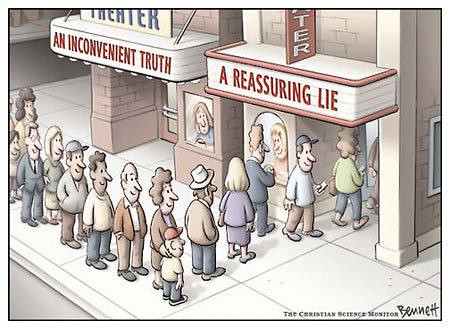General Discussion
Related: Editorials & Other Articles, Issue Forums, Alliance Forums, Region ForumsAlmost too close to the truth to be funny ...
What the American public prefers to be told . . .

Response to markpkessinger (Original post)
Tesha This message was self-deleted by its author.
saras
(6,670 posts)Solly Mack
(90,758 posts)BrendaBrick
(1,296 posts)I've bookmarked this - though it is dated over 2 years ago (12-9-09), it sadly is even more relevant today:
The Psychology of Climate Change Denial
By Brandon Keim Email Author
December 9, 2009 |
1:29 pm |
Categories: Brains and Behavior, Earth Science, Environment

Even as the science of global warming gets stronger, fewer Americans believe it’s real. In some ways, it’s nearly as jarring a disconnect as enduring disbelief in evolution or carbon dating. And according to Kari Marie Norgaard, a Whitman College sociologist who’s studied public attitudes towards climate science, we’re in denial.
“Our response to disturbing information is very complex. We negotiate it. We don’t just take it in and respond in a rational way,” said Norgaard.
The Intergovernmental Panel on Climate Change declared in 2007 that greenhouse gases had reached levels not seen in 650,000 years, and were rising rapidly as a result of people burning fossil fuel. Because these gases trap the sun’s heat, they would — depending on human energy habits — heat Earth by an average of between 1.5 and 7.2 degrees Fahrenheit by century’s end. Even a midrange rise would likely disrupt the planet’s climate, producing droughts and floods, acidified oceans, altered ecosystems and coastal cities drowned by rising seas.
“If there’s no action before 2012, that’s too late. What we do in the next two to three years will determine our future,” said Rajendra Pachauri, the IPCC chairman, when the report was released. “This is the defining moment.”
Studies published since then have only strengthened the IPCC’s predictions, or suggested they underestimate future warming. But as world leaders gather in Copenhagen to discuss how to avoid catastrophic climate change, barely half the U.S. public thinks carbon pollution could warm Earth. That’s 20 percent less than in 2007, and lower than at any point in the last 12 years. In a Pew Research Center poll, Americans ranked climate dead last out of 20 top issues, behind immigration and trade policy.
Wired.com talked to Norgaard about the divide between science and public opinion.
Wired.com: Why don’t people seem to care?
Kari Norgaard: On the one hand, there have been extremely well-organized, well-funded climate-skeptic campaigns. Those are backed by Exxon Mobil in particular, and the same PR firms who helped the tobacco industry (.pdf) deny the link between cancer and smoking are involved with magnifying doubt around climate change.
That’s extremely important, but my work has been in a different area. It’s been about people who believe in science, who aren’t out to question whether science has a place in society.
Wired.com: People who are coming at the issue in good faith, you mean. What’s their response?
Norgaard: Climate change is disturbing. It’s something we don’t want to think about. So what we do in our everyday lives is create a world where it’s not there, and keep it distant.
For relatively privileged people like myself, we don’t have to see the impact in everyday life. I can read about different flood regimes in Bangladesh, or people in the Maldives losing their islands to sea level rise, or highways in Alaska that are altered as permafrost changes. But that’s not my life. We have a vast capacity for this.
Rest here: http://www.wired.com/wiredscience/2009/12/climate-psychology/
I dunno, The post states: "Almost too close to the truth to be funny..." may not be a bad idea!
Maybe a creative way/avenue to get folks to really stop and think (and digest) this information may not be so much with hard-hitting facts...outright, but to perhaps meld these facts somehow in a gentler, satirical way...like maybe turning Jon Stewart's book: "Earth (The Book)" into a combination factual/comedic-satirical/sci-fi movie
RainDog
(28,784 posts)and politicians get elected for pandering to stupidity, the inability to face and solve problems is the outcome.
honestly, literalist religious believers, imo, are dangerous to this nation b/c they want to believe lies and refuse to look at facts.